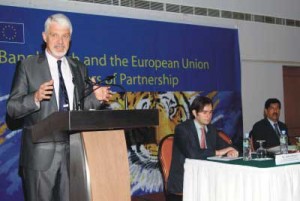


May 16, 2012
Bangladesh must diversify exports: EU envoy
Bangladesh needs to diversify its export basket and go beyond traditional destinations to keep the growth pace steady in the European market, said the head of the EU delegation to Bangladesh yesterday.
“Bangladesh has been known for consistent progress in export for the last three years. And no other least developed countries made so much progress during this period,” said William Hanna.
“This progress is not just because the country was provided duty-free access to the European market, but the qualitative standards of Bangladeshi products helped it achieve the growth,” he added.
“However, Bangladesh needs to diversify its products and export destinations further to sustain the growth in export to the European market,” said Hanna.
He was speaking at a seminar on "Bangladesh and the European Union: 40 years of partnership" organised by the EU delegation to Bangladesh at Lakeshore Hotel in Dhaka.
Bangladesh saw 28.3 percent export growth in 2011 calendar year, said the envoy.
“I am optimistic that the growth in export in the EU market will continue, but the growth is slowing down gradually because of the current economic downturn.”
Hanna said there are opportunities to expand the market for Bangladeshi products in the EU further, and pharmaceuticals, shipbuilding, leather and footwear, and light engineering products can be the next big sectors for export.
“The challenge is to move forward with the diversification, and the EU will support through responding to that challenge.”
The EU and the US are the two biggest export destinations of Bangladeshi products with 51 percent and 22 percent market shares respectively.
However, the European buyers are becoming more and more sensitive about labour standards and environment compliance, said Hanna.
"(European) consumers want to pay more if it is written on the product's label that it has been produced complying with environment and labour standards," he added.
In response to a query about the recent unrest in some garment factories, Hanna said, “A good manager always keeps his employees happy, because the productivity will be high when a worker is happy.”
He also said the EU will continue to work closely with Bangladesh to support its development through strengthening democracy and ensuring human rights.
In his paper, Zillul Hye Razi, trade adviser to the delegation of the EU to Bangladesh, said the new rules of origin, which came into effect in January 2011, played a key role in boosting Bangladesh's exports to the EU.
He said the EU is the number one trade partner of Bangladesh. In 2010, 51 percent of the total Bangladeshi exports went to the EU, while about 7 percent of total import was from the bloc.
Bangladeshi exports increased to 8.6 billion euros in 2011 from 6.7 billion euros in 2010.
Bangladesh exported 88 percent of its total garment products and 4 percent of total agriculture and fisheries products to the EU in 2011. During this time, Bangladesh imported 56 percent of its total import of machinery and transport equipment, and 13 percent chemicals from the EU.
However, exports of pharmaceuticals, bicycle, tea and ceramic products declined during the period, said the paper.
Bangladesh's average export growth to the EU between 2007 and 2011 was 13.8 percent.
Andrew Barnard, first secretary of the EU delegation to Bangladesh, was also present at the seminar.
Source : The Daily Star

Copyright © 2020, The Bangladesh Garment Manufacturers and Exporters Association.
Version-2.0, Design & Developed by Systech Digital Limited.
Version-2.0, Design & Developed by Systech Digital Limited.
